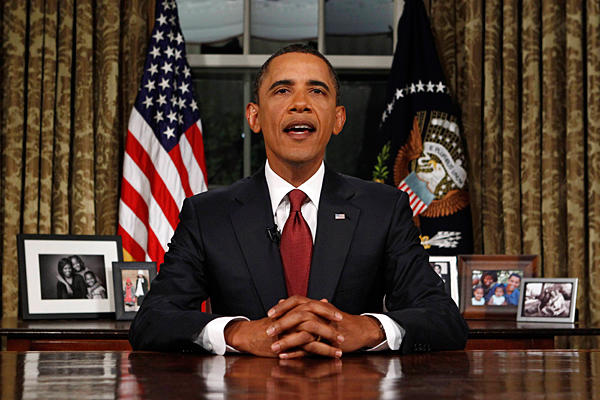President Obama, assuring people that NSA vacuuming up huge amounts of phone metadata isn’t as creepy as it sounds:
When it comes to telephone calls, nobody is listening to your telephone calls. That’s not what this program is about. As was indicated, what the intelligence community is doing is looking at phone numbers and durations of calls. They are not looking at people’s names, and they’re not looking at content. But by sifting through this so-called metadata, they may identify potential leads with respect to folks who might engage in terrorism. If these folks — if the intelligence community then actually wants to listen to a phone call, they’ve got to go back to a federal judge, just like they would in a criminal investigation.
So I want to be very clear — some of the hype that we’ve been hearing over the last day or so — nobody is listening to the content of people’s phone calls. This program, by the way, is fully overseen not just by Congress, but by the FISA Court — a court specially put together to evaluate classified programs to make sure that the executive branch, or government generally, is not abusing them, and that it’s being carried out consistent with the Constitution and rule of law.
And so, not only does that court authorize the initial gathering of data, but — I want to repeat — if anybody in government wanted to go further than just that top-line data and want to, for example, listen to Jackie Calmes’ phone call, they would have to go back to a federal judge and indicate why, in fact, they were doing further probing.
You got that? They are only getting metadata. No big deal, right? If they really want the juicy goods, then they’ve got to go back to a federal judge. This argument rests on the premise that phone metadata is not, in and of itself, highly sensitive data. Which, when you think about it, is not really a hypothetical or philosophical question. It’s an empirical one. It’s something you could test. So… what kind of info can you glean from a person’s metadata?
The folks at Web Policy set out to answer the question. They used metadata gathered from a small number of volunteers over just a few months to see what they could learn about those volunteers looking only at metadta. Turns out, they could learn quite a lot.
The degree of sensitivity among contacts took us aback. Participants had calls with Alcoholics Anonymous, gun stores, NARAL Pro-Choice, labor unions, divorce lawyers, sexually transmitted disease clinics, a Canadian import pharmacy, strip clubs, and much more. This was not a hypothetical parade of horribles. These were simple inferences, about real phone users, that could trivially be made on a large scale.
This, ladies and gentlemen, is the kind of information your government can collect on you without a warrant or notification or really any restriction of any kind. But that’s not all.
- Participant A communicated with multiple local neurology groups, a specialty pharmacy, a rare condition management service, and a hotline for a pharmaceutical used solely to treat relapsing multiple sclerosis.
- Participant B spoke at length with cardiologists at a major medical center, talked briefly with a medical laboratory, received calls from a pharmacy, and placed short calls to a home reporting hotline for a medical device used to monitor cardiac arrhythmia.
- Participant C made a number of calls to a firearm store that specializes in the AR semiautomatic rifle platform. They also spoke at length with customer service for a firearm manufacturer that produces an AR line.
- In a span of three weeks, Participant D contacted a home improvement store, locksmiths, a hydroponics dealer, and a head shop.
- Participant E had a long, early morning call with her sister. Two days later, she placed a series of calls to the local Planned Parenthood location. She placed brief additional calls two weeks later, and made a final call a month after.
Nothing to worry about, right? It’s just metadata, after all. It’s not like they’re listening to your calls, or something.

I came across this right after I posted the original article: 70% of US spending is writing checks to individuals. (Investors.com)
If you ever wanted to understand the primal animus of the Tea Party, there you go. A government that can keep tabs on the private affairs of citizens and upon which private citizens are increasingly reliant is just a little too “Big Brother” for me. No, I’m not suggesting we’re anywhere near a police state or anything of the kind (I’m sure the NSA actually spends most of their time looking for terrorists), but it’s a little too close for comfort.
I’d feel better if all that government spending was for some kind of sensible anti-poverty relief (like the EITC or job training), but it isn’t.
Oh, yeah, and “the richest 1% of Americans… receive roughly $10 billion each year in federal checks.” A government that is heavily involved in redistributing cash to individuals Americans is inevitable going to be a government rife with corruption and abuse. The authority to tax and redistribute makes control and influence of politicians a top priority for the well-connected. Cronyism is the inevitable scion of government interventionism.
Yeah, it really doesn’t take a genius to put two and two together with metadata. The majority of espionage and surveillance work consists of compiling metadata.